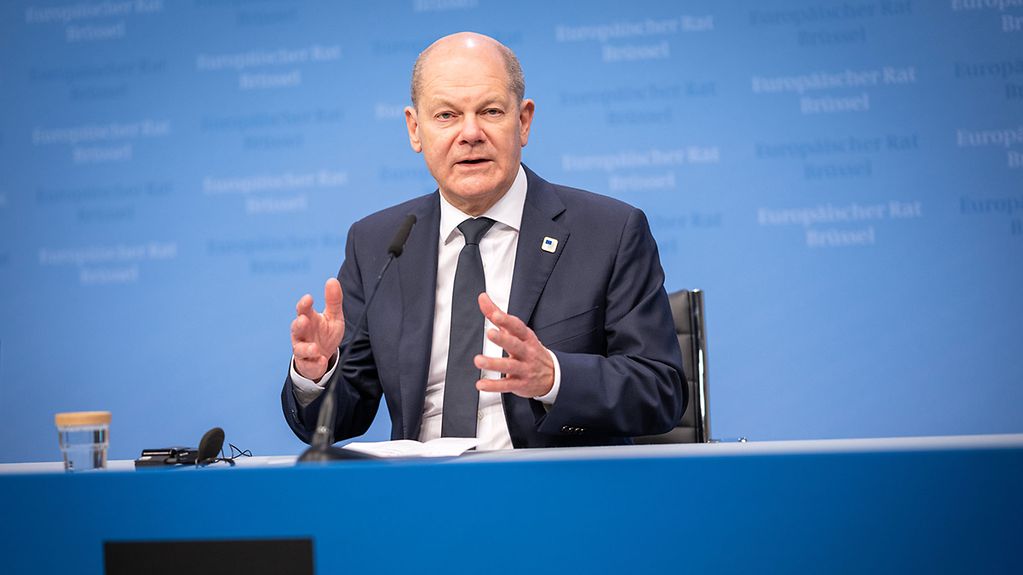European Council meeting in Brussels
The EU heads of state and government have decided to take up membership negotiations with Bosnia-Herzegovina. Federal Chancellor Scholz believes this is “a good decision”. The European Council also agreed on further financial aid for Ukraine.
3 min reading time

“At the European Council meeting, we agreed to massively increase support for Ukraine,” said Federal Chancellor Scholz at the final press conference.
Photo: Federal Government/Bergmann
During its meeting in Brussels, the European Council decided to take up membership negotiations with Bosnia-Herzegovina. Federal Chancellor Scholz welcomed the move, describing it as “a good decision” and a “promising sign”. Scholz also stressed that the “processes with Moldova, Ukraine and Georgia are underway, and progress has been made here, too”.
The Federal Chancellor is also committed to advancing internal reforms within the EU, which will enable the EU to become stronger through enlargement. He advocated quicker and shorter decision-making processes, for example, and spoke in favour of majority decisions, for instance in foreign-policy and fiscal issues.
Further support for Ukraine
The European Council also addressed the Russian offensive against Ukraine that constitutes a violation of international law. Federal Chancellor Scholz said that the EU member states had increased their bilateral aid for the invaded country. Germany had “provided a total of 28 billion euros in arms aid alone to date,” he stated. Scholz welcomed the decision taken by the EU heads of state and government to massively increase support and make more resources available to this end.
Firstly, the European Peace Facility of financial resources for military support is to be topped up considerably: “We are talking about five billion euros to be made available for this,” Scholz said. Secondly, the European Council decided to use windfall profits from frozen Russian assets for buying ammunition and weapons.
The European Council reached another agreement, too: European funds can now be used for sourcing arms and ammunition not only in Europe but worldwide.
The Federal Chancellor’s overall assessment of the measures taken is that they were a “very, very big step forward and are therefore a sign of us being on the right track and being in agreement in this regard”.
In his government statement prior to the European Council meeting, Federal Chancellor Scholz praised the cohesion and unity of the EU member states. “Only Europe can give us the strength and power we need to defend prosperity and democracy in the world of the future,” the Federal Chancellor said previously, concluding his speech in the Bundestag.
Ceasefire and release of hostages
Another topic discussed by the Council was the situation in the Middle East. In its conclusions, the European Council once more condemned the arbitrary attacks by Hamas on 7 October 2023. It also called for an immediate humanitarian pause as a prerequisite for a lasting ceasefire, along with the unconditional release of all hostages and the provision of humanitarian aid. The Federal Chancellor also believes that it is important for the bodies of deceased hostages to be handed over to their families, to enable them to bid farewell to their loved ones.
Concerning humanitarian aid that actually reaches the civilian population in Gaza, Scholz pointed out that “it is not enough”. He added that it was not possible to provide sufficient supplies by sea and air alone. In addition, 500 lorries per day were needed via the land route, Scholz said in Brussels.
You can read the conclusions of the European Council issued on 21 March 2024 here.
Capacity in defence and industry
Security policy is a present-day challenge linked to the change of times we are currently experiencing. This is why the European Council also looked into a lasting increase of production capacity in the defence industry. Scholz pointed out that this sector had to expand its capacity to be able to produce more weapons, also for Europe.
A Euro summit took place right after the European Council meeting at which the capital market union was discussed in particular. In the concluding press conference, Scholz said that the lack of a highly efficient capital market and banking union prevented the European Economic Area from realising its full potential. Scholz described such a union as an essential resource for future growth. These topics are to be discussed further at the next European Council meetings in April and June.
You can find out more about the Federal Government’s European policies on our Europe page.